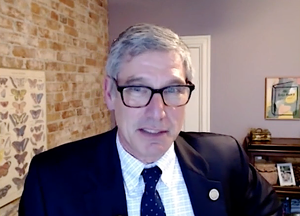PASSHE chancellor says dissolving system best if redesign plan fails

(The Center Square) – The Pennsylvania State System of Higher Education lingers on the brink of dissolution unless schools find a financially sustainable path forward, Chancellor Dan Greenstein said this week.
His comments came amid an exchange with Sen. Joe Pittman, R-Indiana, during a Senate Appropriations Committee hearing Thursday about the value of belonging to a state-run higher education network. Pennsylvania operates 14 colleges in its system, but the unprofitability of some universities – as a result of reduced state funding and dwindling enrollment – threatens the stability of them all, Greenstein said.
“Senator, unless we figure this out, I will be recommending to the board that we come back to the Senate next year with a legislative package to dissolve the system, because if we continue to go down this path, what you are going to see is that cross subsidization is going to drain all of us,” he said.
Pittman pointed to retrenchment, retirements and layoffs at Indiana University of Pennsylvania (IUP) as an example of the “cross-subsidization” happening across the system, where more profitable schools balance out the shortcomings of failing schools.
“That’s one of my biggest frustrations,” Pittman said. “I am concerned that pain is not being shared equally. In fact, that pain is being borne because of their (IUP) ability in previous years to support weaker universities in the system.”
Greenstein agreed, noting that schools with larger class sizes and higher teacher/student ratios often subsidize those with smaller classes sizes and ratios without addressing the underlying causes of shrinking enrollment.
“There are good reasons to subsidize some schools, but not to the extent that they should operate in ways that aren’t sustainable,” he said. “Especially now that the subsidizers, and IUP is a great example, are under a high amount of pressure.”
PASSHE enrollment peaked at 112,000 in 2010, and state funding at the time exceeded $503 million. In the decade since, enrollment declined 31% across 12 of the 14 universities, with a little over 95,000 students attending in 2019. State funding dipped more than $90 million through 2015, though it’s since climbed back up to $477.5 million over the last six years.
This year, PASSHE requests a 2% increase to $487 million.
“Not doing anything is a certain pathway to a very unfortunate end,” Greenstein said. “It’s not that we just have universities that are challenged, we have universities that are challenged and threatening to take others down with them.”
Minority Chairman Vince Hughes, D-Philadelphia, urged restraint and nuance when discussing a dissolution of the system, pointing to the state’s history of underfunding.
“That’s a hot point, and so we need to be real careful about how we make those statements because it has a ripple effect in terms of how we respond,” he said. “The funding patterns from the Legislature have been insufficient and therefore something different has to occur.”
Greenstein warned that even the $100 million redesign won’t lower tuition rates or generate cost savings, but rather it will encourage growth.
“I think the question is, how do we find more support for the system even in a redesigned environment?” Hughes said. “You’re forcing the hand in many respects of creating greater efficiencies … but even with that, we still gotta find more money.”
PASSHE will present its system redesign proposal to board members next month. The plan, in part, focuses on combining administration, academics, faculty and staff at Bloomsburg, Lock Haven and Mansfield universities in the north and California, Clarion and Edinboro universities in the west. The integrated schools would also share budgets and operate as single accredited institutions, but the individual campuses would stay open.
But even with the deadline looming, Greenstein could provide few details about how much PASSHE has spent implementing the redesign or what type of efficiencies it could produce.
“This is not about cost saving,” he said. “This is about investing in growth.”
Sen. Lindsey Williams, D-Pittsburgh, who chairs the Senate Education Committee, pushed back against Greenstein’s comments and chastised him for lacking specifics or being unable to promise a reduction in tuition, despite the system becoming unaffordable for many students.
“I don’t think anyone here thinks we should continue as we are,” she said. “I just feel like I’m missing huge portions of the puzzle here, and we are weeks away from it being presented to the board of governors, and we have no information. That’s where my frustration is.”
Disclaimer: This content is distributed by The Center Square



